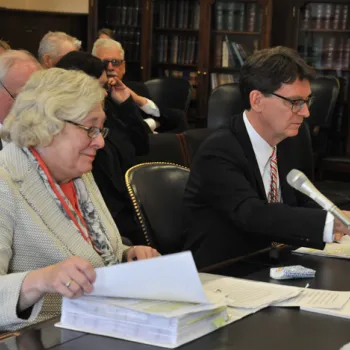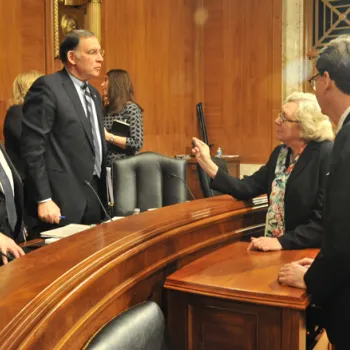Updated: 3/26/2015
In order to adequately support the Constitutional and statutory mission of the federal courts, the Judiciary asked Congressional appropriators to provide $7 billion in discretionary funding for fiscal year 2016, a 3.9 percent increase over the preceding year.
“We believe the request achieves our goal of holding down cost growth across the Judiciary where possible, while also investing in several important new information technology and program initiatives that will improve Judiciary operations,” said Judge Julia Gibbons, chair of the Judicial Conference’s Budget Committee.
Judge Gibbons appeared with Administrative Office Director James C. Duff, before the Senate Appropriations Subcommittee on Financial Services and General Government on March 24. They testified before the House Appropriations Subcommittee on Financial Services and General Government on March 25.
The requested funds for fiscal year 2016 would maintain current court services while investing in several important program improvements and enhancements, including a national information technology hosting initiative for the courts—saving as much as 40 percent in lower hardware and software costs while providing standardized security. Funds also would expand evidence-based offender supervision practices to reduce recidivism rates among offenders.
The Judiciary’s budget also requests funding to increase to $134 the hourly rate paid to private practice attorneys representing federal defendants under the Criminal Justice Act, and a $10 increase – to $50 – in the daily rate paid for federal jury service, which would be the first such increase in 25 years.
Much of Judge Gibbons’ testimony focused on cost-containment.
The Judiciary’s stewardship and cost containment policies have produced a cost avoidance of nearly $1.5 billion relative to projected requirements since 2005. A new round of cost-containment initiatives is underway. But “no amount of cost containment will offset budget cuts or even flat funding in fiscal year 2016,” Judge Gibbons said.
In her testimony, Judge Gibbons highlighted the Judiciary’s space reduction efforts:
As of October 2014, efforts to reduce the Judiciary’s footprint have removed 242,403 square feet of space from the rent bill, with an annual rent cost avoidance of $5.8 million to the Judiciary.
42 percent of all courts have formal arrangements to share administrative services, in addition to many informal or temporary arrangements; and
10 projects are in the design phase with another in implementation to create smaller, more efficient workplaces.
“The Judiciary’s fiscal year 2016 request will maintain current services across the Judiciary, continue the recovery and restoration of activities that were disrupted because of sequestration, and enable investment in important new or upgraded program initiatives needed to support judicial operations,” Judge Gibbons said in her testimony.
Subscribe to News Updates
Subscribe to be notified when the news section is updated.


